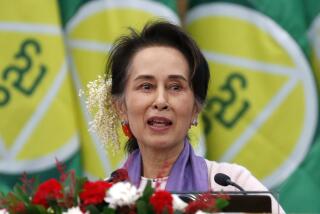Cambodia King Refuses to OK Khmer Rouge Amnesty Offer
- Share via
PHNOM PENH, Cambodia — Cambodia’s king refused to approve amnesty for two leaders of the genocidal Khmer Rouge today, contradicting the country’s prime minister who pledged to shield them from trial.
The refusal casts doubt on the legitimacy of the deal Prime Minister Hun Sen has granted the two Khmer Rouge leaders, Khieu Samphan and Nuon Chea, to defect to the government in exchange for assurances that they will not be tried for crimes against humanity.
“Taking into account the very wide and undeniable discontent of the majority of the [Cambodian] people, I announce to this majority that I respect them and will not renew my power of amnesty for major Khmer Rouge criminals,” King Norodom Sihanouk said.
Sihanouk, 76, who is receiving medical treatment for a number of ailments in Beijing, made the comments in a statement faxed to news organizations.
Sihanouk said an international tribunal would have “the perfect right to take up the case of genocide in Cambodia because it concerns crimes against humanity.”
“That concerns the conscience of the community of all the world’s peoples,” the king said.
The announcement came hours after the two Khmer Rouge leaders apologized for the deaths of more than 1 million people during their regime in the 1970s and asked Cambodians to forget the past.
Yet neither of the elderly revolutionaries accepted personal responsibility for the massacres during their rule.
Khieu Samphan, 67, and Nuon Chea, 71, were flown by helicopter from a former rebel stronghold to this capital to, in effect, surrender to Hun Sen after he pledged that they would not face trial for crimes against humanity.
At a news conference Tuesday in Phnom Penh, they were asked by journalists--many of them Cambodians who lost family members--if they felt any remorse for causing the deaths of more than 1 million people out of the nation’s then-population of 8 million.
“Yes, sorry, very sorry,” Khieu Samphan said, looking red-faced and sullen.
“We would like to apologize and ask our compatriots to forget the past so our nation can concentrate on the future,” Khieu Samphan said. “Let bygones be bygones.”
The Maoist revolutionaries won a civil war in 1975 and forced the population into slave labor camps, where many died of overwork, starvation, disease or through execution.
More to Read
Sign up for Essential California
The most important California stories and recommendations in your inbox every morning.
You may occasionally receive promotional content from the Los Angeles Times.









